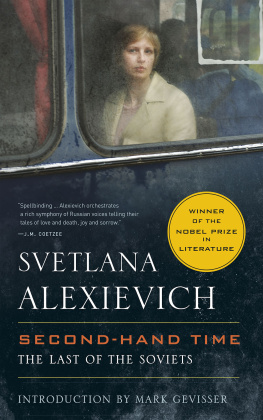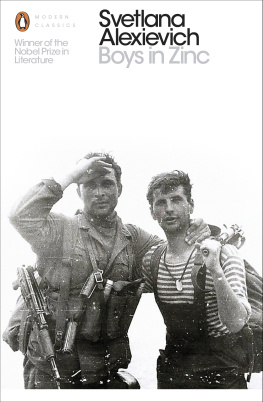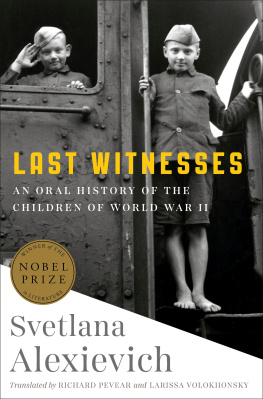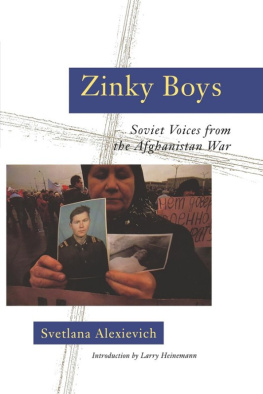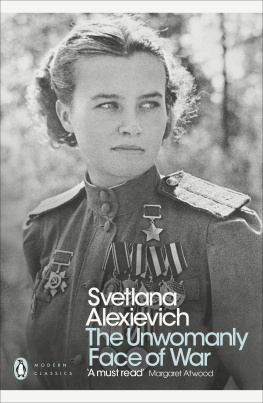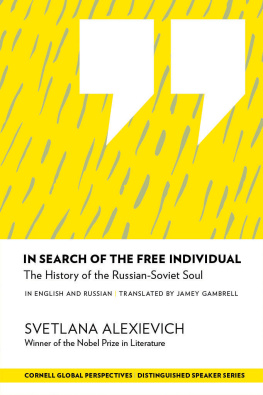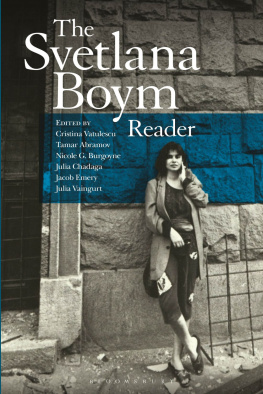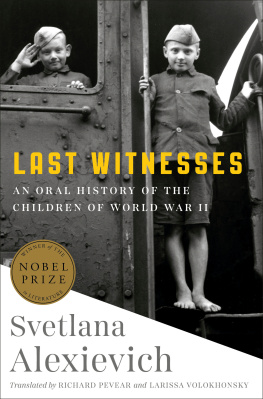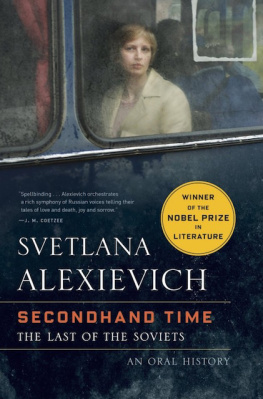AN INTRODUCTION TO THE SOUTH AFRICAN EDITION
* * *
By Mark Gevisser
We South Africans knowas do people who come from the countries that used to comprise the Union of Soviet Socialist Republics (USSR)what it means to swim in the stream of history. But immersing myself in Second-Hand Time was an experience like none other I have had in my reading life. It felt like I had been thrown into the river of time, a river made of words; the words of other people, channeled by the author, Svetlana Alexievich, and yet barely controlled by her; words exhilarating in their fluency and passion and yet devastating in their accounts of suffering and forbearance.
There is a sense of this energy in the way Alexievich began her acceptance lecture after winning the 2015 Nobel Prize in Literature:
There are voices around me, hundreds of voices. They have always been with me, since childhood. I grew up in the countryside. As children, we loved to play outdoors, but come evening, the voices of tired village women who gathered on benches near their cottages drew us like magnets. None of them had husbands, fathers or brothers.
Alexievich was born in 1948, in the aftermath of World War II, in the Carpathian borderland town of Ivano-Frankivsk, to schoolteacher parents, a Ukrainian mother and Belarusian father. The region is one of historys doormats: previously Polish and Austro-Hungarian, it was part of the Ukraine from 1918, and was annexed by the USSR when liberated from the Nazis in 1944. She was raised in Belarus, also part of the USSR, where one in four people had been killed fighting during the war, she said in her lecture, and so
we children lived in a world of women. What I remember most, is that women talked about love, not death. They would tell stories about saying goodbye to the men they loved the day before they went to war, they would talk about waiting for them, and how they were still waiting. Years had passed, but they continued to wait: I dont care if he lost his arms and legs, Ill carry him. No arms... no legs... I think Ive known what love is since childhood...
Such womentragic, heroic, maybe crazyhaunt Second-Hand Time. They renounce everything, sometimes their lives, for their useless, damaged warriors. And in the way Svetlana Alexievich listens to them and to their men, she has indeed, through her polyphonic writingsas the Swedish Academy put it in her Nobel commendationcreated a monument to suffering and courage in our time.
The Nobel decision was a bracing, somewhat startling one. Only very few non-fiction writers have won the prize before, Aleksandr Solzhenitsyn and Winston Churchill among them. They have been powerful men; scholars, explainers. Alexievich, a woman in late middle age at the time of her award, could not be more different. She is dogged and diffident, a listener rather than a talker, and has invented an entirely new form, one which crosses the genre boundaries of journalism and literature, in the way it orchestrates the voices of ordinary people into a series of sweeping, tragic symphonies aboutas she puts itan eternal dialogue of the executioners and the victims that is the epoch of Soviet, and now post-Soviet, history.
The historian Timothy Snyder uses a Polish term to describe Alexievichs genre: literatura faktu , the literature of fact. The author herself notes, in Second-Hand Time , how she always has her finger on the red button of her pocket recorder, so as not to miss [the] transformation of lifeeveryday lifeinto literature. For Alexievich, a fragment of literature may sparkle into sight at any given moment; if Flaubert called himself a human pen, she said in her Nobel lecture,
I would say that I am a human ear. When I walk down the street and catch words, phrases, and exclamations, I always thinkhow many novels disappear without a trace! Disappear into darkness. We havent been able to capture the conversational side of human life for literature. We dont appreciate it, we arent surprised or delighted by it. But it fascinates me, and has made me its captive. I love how humans talk... I love the lone human voice. It is my greatest love and passion.
That use of the word lone is critical to Alexievichs project. She was raised, writes Snyder, in the wake of the calamities of both World War II and Soviet collectivization, calamities that were covered in beautiful myths, myths that worked in part because people wanted individual suffering and death to have meaning. Second-Hand Time picks, insistently, at this conundrum: she wants to understandand wants us to understandhow people could love the system that oppressed them so much, people like her own beloved father, who kept his Party membership card until his recent death, hanging on to an idealism that seemed to justify the horrors to which his generation was subject.
Belarus, where Alexievich still lives, is now an independent country ruled by Alexander Lukashenko, Europes last full-throttled dictator. Alexievich is an outspoken critic of the Lukashenko regime, and has consequently never been published in her home country. Still, but for a period of self-imposed exile in the 2000s, she has lived most of her adult life in Minsk, the capital, most of it in the same apartment, with her long-term companion next door. For decades, she traveled the USSR as a journalist, returning home to write her books.
In Second-Hand Time , published in Russia in 2013, Alexievich expands the form she developed in these earlier books into a masterpiece that is comparable, in historical sweep and emotional depth, to Leo Tolstoys War and Peace or Vasily Grossmans Life and Fate . It will come to define the moment of the collapse of the USSR much as those previous works did the Russian Imperial 19th century or the era of high Stalinism. Second-Hand Time is not a book of the present, although some of its later chapters describe dynamics very much alive in todays Russia, such as the xenophobia and violent hypermasculinity. Rather, it is something of a Truth Commission of the Soviet soul, a document of the transition itself, pivoted on those crucial few days in August 1991 when a military putsch was put down by the masses of people who came to the defence of Boris Yeltsins government.
In this book, then, we encounter the sovok , a somewhat disparaging terma pun on the Russian word for dishragfor one who adheres to Soviet cultural values and behavioral patterns. These people, for whom Alexievich has great empathy, are awash in a world where, as one of them puts it, the people who read books and dreamt of flying, like Checkhovs seagull, were replaced by those who didnt read but knew how to fly. An old Kremlin denizen contradicts this, bitterly: Our era is evil. Empty. Were drowning in flashy rags and VCRs... The way we are now wed never triumph over anyone. Gagarin wouldnt even get off the ground.
By documenting such despondency, Alexievich helps us understand the rise of the autocratic, imperial Vladimir Putin. What is our National Idea, besides salami? asks a devastated woman, during Russias transition period. Her best friend disagrees: she loved the way Perestroika transformed the country into a debating society; the Voice of America broadcasts from the West were a beautiful crackling to which you could fall in love, and she spent years scrubbing away the Soviet mentality. But as the Putin era asserts itself even she becomes despondent: Theyd given us a little air, now everything was going to go on lockdown again. Theyd chase us back into the cage, rub us into the asphalt... Wed be like butterflies in cement.

